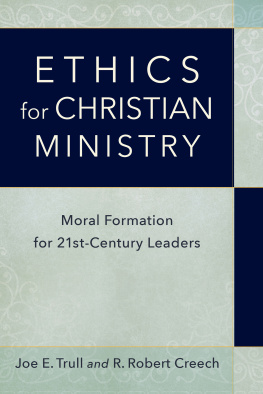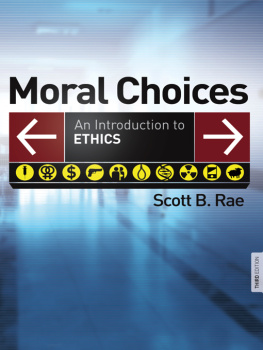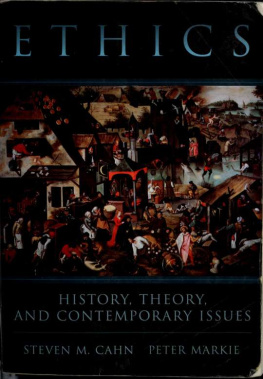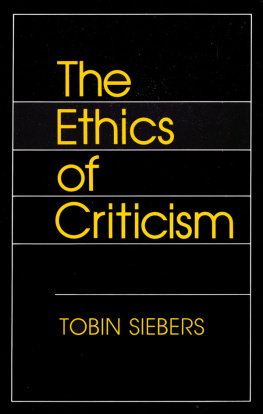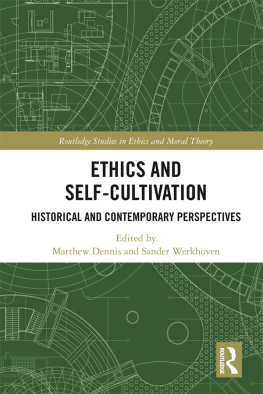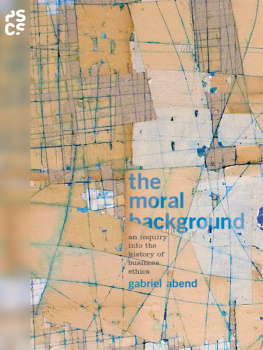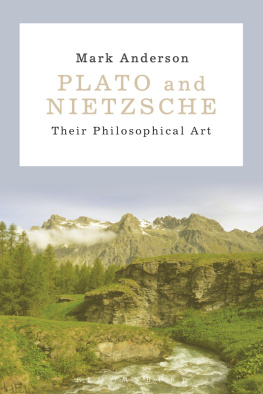Copyright 2012 by Kristen R. Monroe
Requests for permission to reproduce material from this work
should be sent to Permissions, Princeton University Press
Published by Princeton University Press, 41 William Street,
Princeton, New Jersey 08540
In the United Kingdom: Princeton University Press, 6 Oxford Street,
Woodstock, Oxfordshire OX20 1TW
All Rights Reserved
Library of Congress Cataloging-in-Publication Data
Monroe, Kristen R., 1946
Ethics in an age of terror and genocide : identity and
moral choice / Kristen Renwick Monroe.
p. cm.
(Pt. 1. the puzzleIntroductionThe Holocaust and genocide
Pt. 2. a study in contrastsTony: rescuerBeatrix: bystander
Kurt: soldier for the nazisFritz: Nazi propagandistFlorentine: unrepentant
political NaziPt. 3. cracking the codeThe political psychology of genocideA theory of moral choiceConclusion: the psychology of difference)
Includes bibliographical references and index.
ISBN 978-0-691-15137-3 (hardcover)
ISBN 978-0-691-15143-4 (pbk.)
1. TerrorismMoral and ethical aspects. 2. TerrorismMoral and ethical aspectsCase studies. 3. GenocideMoral and ethical aspects. 4. Genocide
Moral and ethical aspectsCase studies. I. Title.
HV6431.M655 2012
172'.1dc22 2011009533
British Library Cataloging-in-Publication Data is available
This book has been composed in Minion Pro
Printed on acid-free paper.
press.princeton.edu
Printed in the United States of America
1 3 5 7 9 10 8 6 4 2
ACKNOWLEDGMENTS
WE ALL HAVE MEMORIES of events so important that we can identify exactly where we were when they happened, who was with us, what we wore, or where we sat. I remember the day my father told me about the Holocaust. We were sitting in the caran old Chevrolet Biscayne, blue, with plastic seat covers that cracked in the cold, made you sweat in the heat, and crinkled whenever you moveddriving from the small midwestern town in which we lived to St. Louis for my weekly piano lesson. I can no longer recount precisely what my father said, but my memory remains fresh with a sense of horror so overwhelming I could hardly breathe. And then Daddy told me, You must always remember that there are no depths to which man cannot sink, but there also are no heights to which we cannot soar.
My father was a judge who took seriously the majesty and the integrity of the law and believed passionately that law should serve humanity in the search for justice. I adored my father and, for many years, intended to follow in his footsteps and become a judge. Eventually, I took another path, but much of my fathers passion and his concern for moral values nonetheless are reflected in my professional life, as in this book. Daddy loved people and was never happier than when talking about important issues with them, and this, effectively, is what I have built my career on: talking with people about what matters in their lives, trying to understand how ordinary human beings respond to the suffering of others, how they make sense of the world around them, and how they navigate the moral terrain of both the everyday and the unexpected events that sometimes challenge them to reach moral choices. I am grateful to my fatherto both my parentsfor giving me this awareness of the important issues of the world and for encouraging a young girl to believe she could play a small part in that world, and that her involvement might matter. It is a gift I wish for my own children and for my students.
I never dreamed I would meet the kind of people I have been privileged to know as part of the research for this project. I was privy to intimate conversations with an extraordinary and an extraordinarily wide range of people, from those who rescued Jews to bystanders and Nazi supporters. Effectively, these people allowed me to walk around inside their heads as they reflected on what drove their moral choices. The conversations were close-to-the-bone and extremely personal; I hope I have honored the trust of the speakers, most of whom have since died and have left their stories with me. To protect their privacy and that of their families, I can thank them only anonymously.
The first interviews for this book were conducted in 1988, and I have thought and talked about this project a great deal over the years. My thanks to all those who listened and shared their insight thus must be extensive, and I apologize that space constraints restrict my ability to mention all of those who were so kind and helpful.
I received valuable feedback on my work during several other public talks, including talks at the University of Nebraska, the Holocaust Memorial Museum (Detroit), the University of Michigan, George Washington University, Duke University, Trinity College Dublin, Simon Wiesenthal-Pepperdine University Institute for Law and Ethics, the Yale Interdisciplinary Center for Bioethics and Yales Genocide Studies Program, and the University of Southern California.
As always, I owe a special debt of gratitude to my colleagues in the departments of Political Science, Philosophy, and Psychology and Social Behavior at the University of California at Irvine (UCI). Members of the Political Psychology Program and the interns and faculty at the Ethics Center provided stimulation and challenging questions: Adam Martin, William Chiu, Bridgette Portman, Lina Kreidie, Ted Wrigley, Kristin Fyfe, Beth Riley, Alexis and Stephanie Etow, Maria Luisa Martinez, and Priyanka Ghosh challenged me as students and Jerry Tobis, Mahtab Jafari, Francisco Ayala, Gloria Mark, Shawn Rosenberg, Kevin Olsen, and Manuel Gomez were supportive faculty colleagues. I have drawn on joint work with Adam Martin and Priyanka Ghosh in at various points. If I have failed to respond satisfactorily to all of their suggestions, their generosity and advice are nonetheless appreciated.
Funding was provided by the Biosophical Institute, UCIs Citizens Peacebuilders, and the UCI Center for Global Peace and Conflict Resolution. Two anonymous readers for Princeton University Press offered valuable comments, and the staff at Princeton University Press performed its usual fine job of editing and bringing the manuscript through production. Special thanks go to Karen Carter and to Chuck Myers, surely one of the worlds most sensitive and caring editors.
As always, my thanks and love go to my mother, Gertrude Renwick Monroe, and to my wonderful children: Alexander, Nicholas, and Chloe, to whom this book is dedicated.



